The Milky Way
Imagine, milk with terroir. Two local Ontario dairy farms are about to revolutionize the way we think about that most basic of foods.
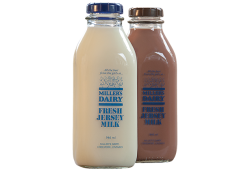 Make history this summer. Walk into a food market in Creemore and pick up some fresh Jersey milk in a glass bottle from Miller’s Dairy. Then drive past John and Marie Miller’s farm on County Road 9 so you can say, “That’s where my milk came from.” Or stop by Bonnie and John den Haan’s Sheldon Creek Dairy near Hockley Valley to buy whole milk direct from the farm, and meet some of the cows it came from that morning.
Make history this summer. Walk into a food market in Creemore and pick up some fresh Jersey milk in a glass bottle from Miller’s Dairy. Then drive past John and Marie Miller’s farm on County Road 9 so you can say, “That’s where my milk came from.” Or stop by Bonnie and John den Haan’s Sheldon Creek Dairy near Hockley Valley to buy whole milk direct from the farm, and meet some of the cows it came from that morning.
Simple as it sounds, neither of these things – buying milk produced by a specific farmer or fresh off the farm – has been legal in Ontario in a half century. Instead, all milk has been blended together by the Dairy Farmers of Ontario (DFO) and trucked hundreds of kilometres to large processors.
Spurred by the demand for local food and stories of a growing underground market for farm-fresh milk, the DFO has launched Project Farmgate, a pilot program to help farmers begin processing milk on-farm.
The first three farms to take part are Limestone Organic Creamery near Kingston and the Millers’ and den Haans’ right here in the hills. All open this spring and for the first time in two generations, since the Ontario Milk Act established the DFO in 1965, consumers will be able to buy cows’ milk direct from the farmers, and select from a specific herd or breed of cow.
The new micro-dairies promise not only a fresher product, but one with a lot more diversity and character. Soon there will be a lot more to say about milk – about nutrients, colour, creaminess and flavour, even season. Imagine, milk with terroir. We may soon become milk connoisseurs. It’s white, liquid proof that consumer demand for local food is making a difference not only to what ends up in our fridges, but to the sustainability of local farms and farming communities.
Miller’s Dairy
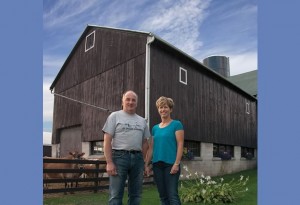
John and Marie Miller Their on-farm dairy promises not only a fresher product but one with more diversity and character. Photo by MK Lynde
The first thing you notice on a visit to John and Marie Miller’s farm is how clean and orderly everything is. The next thing is John Miller’s great enthusiasm and pride as he shows you around.
With 120 cows and 700 acres, Jalon Farms is about twice the size of the average Ontario dairy farm, and it’s nearly self-sufficient. The Millers grow most of their own feed with surplus to sell.
There’s a new free-stall barn, built in 2004, with computerized milking machines that monitor the exact movements and milk production of every cow. The brown Jerseys wander freely and mingle on the clean floors. They have cushioned sleeping mats and John addresses each one affectionately by name. It’s super high-tech and cow friendly.
Just a few steps away, between the new barn and the old grey one, across the driveway from the heritage farmhouse, the processing plant stands nearly complete. It’s compact, no bigger than a large house, but in every other way a full-fledged modern dairy that will soon sparkle with stainless steel equipment and sterile white walls. It is here the Millers’ milk will be piped the short distance from the milk room, where it has been chilled in a large stainless steel tank. His cows produce 60,000 litres a month, and one day he hopes to sell it all through Miller’s Dairy. In the meantime he can sell any surplus to the DFO.
John Miller has dairying in his blood. He’s the fifth generation of Millers to farm here, and his mother grew up with a dairy on her family farm in Goderich. John’s great-grandfather, Sam Bisset, was credited with being the first dairy man in Canada to sell milk in a bottle in 1896, replacing the old practice of ladling milk into a housewife’s pitcher from a tank on the back of a wagon.
Like most small-town dairies, Bisset’s eventually closed down. Until last year, when a small on-farm dairy in Nova Scotia, called Fox Hill Cheese House, began selling whole milk in glass bottles, no farmers in Canada were processing their own fluid milk on-farm anymore. (The handful of on-farm processors in Ontario, such as Saugeen County Dairy near Markdale or Mapleton’s Organic in Moorefield, make other milk products, such as yogurt and ice cream.)
John chose to open his dairy as a way to expand his business without acquiring more land or cows. To add cows, he would have had to buy dairy quota, which is hard to get, and expensive (more than $25,000 per cow). The plant also provides his 20-year-old stepson, Shawn Corbeil, with the chance to stay and pursue his career on the farm. But what John seems most happy about is that he will be able to sell milk exclusively from his own herd, and that there are consumers out there who care about the milk they’re drinking.
“What makes our dairy unique is that we’re using Jersey milk,” says John. When Ontario’s milk marketing authority came into existence in 1965, it began mixing milk together for efficiency of transport and sale. That’s when milk became just “milk” as we now know it, a mix that’s about 90 per cent Holstein.
“All the unique milks that were on the market – Jersey, golden Guernsey, Ayrshire – all ended. This will be the first fluid Jersey milk plant in Ontario in 45 years,” John says. He notes Jersey milk is 15 per cent higher in protein and 20 per cent higher in calcium. It is prized for its fuller, richer flavour and the quality of its cream for baking and desserts.
And then there is the pride of having the Miller family name on the bottle. Pamela, Mary and Candice, the three cows on the label, are actual animals in the Miller’s Dairy herd. John has a story for each. For instance, Mary was a calf named after his mother, born on her birthday in 2001, which turned out to be her last. “She represents the roots and heritage of Miller’s dairy,” he says.
“Bread, milk and butter are of venerable antiquity.
They taste of the morning of the world.”
Leigh Hunt (1784-1859) from ‘the seer’
Sheldon Creek Dairy
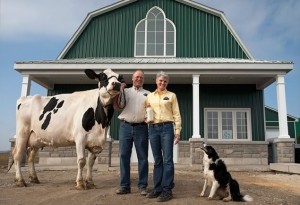
Sheldon Creek Dairy John and Bonnie den Haan with Parnella the cow and their dog, Meg. Photo by MK Lynde
At Haanview Farms, the 140- Holstein farm that John and Bonnie den Haan operate on 274 acres in Hockley Valley near Loretto, there is a similar eagerness to connect with the consumer. Bonnie den Haan talks as if she’s been waiting all her life to give the world a taste of milk fresh from the cow, as if their new business venture was motivated by nothing more than whole milk evangelism.
“We strive really hard to produce really good tasting milk, so we’d like to share that with everybody,” she says. Bonnie likens milk to sweet corn the day it’s picked. You can taste the freshness.
Unlike most modern dairy farms, Haanview pastures its cows in the summer, so Bonnie says you may even detect a yellow tint in the milk from the grass of the Sheldon Creek pastures: “Someone with a sensitive palate or a connoisseur of milk and butter would notice the difference.”
While Miller’s Dairy will sell through grocery stores and other businesses, Sheldon Creek Dairy will sell direct through its own store, set to open in May, so you can buy milk from the farm on the day it’s milked and processed, even meet the cows.
Sheldon Creek’s website promises milk “like your grandparents drank, fresh from the cow … with cream that rises to the top.” It will be whole milk in glass bottles, not homogenized, and pasteurized only enough to meet health regulations. “It’s as close to the cow as you can get and be legal,” says Bonnie.
On-farm dairies compete with the industrial food system, so you might have expected political obstacles, but not anymore. Opening a dairy is expensive and complicated, yes. Both the Millers and den Haans have spent nearly a million dollars each. Yet virtually everybody, from the DFO to industry to every level of government, seems in love with the idea of bringing back the local dairy.
“We’re promoting that we take care of our animals, that farming is good, that it’s good for the people, and milk is good for you. It’s a feel-good story,” says Bonnie. She describes their start-up process as two years of “endless conversation and coffee” with keen supporters.
Miller’s Dairy sailed through Clearview Township’s planning process. The project is lauded by local mayor Ken Ferguson and ecstatically supported by two local MPPs, Jim Wilson and Garfield Dunlop. After the ground breaking last August, all the local papers ran stories.
John Miller figures that 10 years ago, nobody would have cared. If the past several decades were a shift away from local food toward a big-box mentality – the market forces that drove his mother’s family’s dairy out of business – the pendulum is finally swinging back.
To design his plant, John hired an engineer who, it turned out, used to work for a big dairy called Alt Foods. His job was to dismantle all the small dairies as Alt took them over, then ship the equipment overseas so nobody could build a competing dairy in Ontario. Thirty years later, John Miller hired him to do exactly the opposite.
It’s ironic that today the best way forward is to reclaim what was lost in our race for the cheap and easy. John has customers calling every day asking when they can buy his milk. Of the 20 clients he has signed up – restaurants, institutions and retailers – he only had to find two. The rest came to him. Nobody even asked the price.
More Info
On-farm dairies in the hills
Sheldon Creek Dairy
4316 5th Concession, Adjala |Northwest of Loretto | 705-435-5454 | www.sheldoncreekdairy.ca
- Sheldon Creek Dairy will sell one-litre bottles of unhomogenized whole milk and yogurt in 500ml tubs from its Holsteins through its on-farm store and select local retailers.
Miller’s Dairy
7280 County Rd 9, Clearview | Just east of Creemore | 705-466-2509 | www.millersdairy.com
- Miller’s Dairy will sell skim, 1 per cent, 2 per cent, chocolate and whole Jersey milk in returnable glass bottles through stores and restaurants in Creemore and surrounding communities.



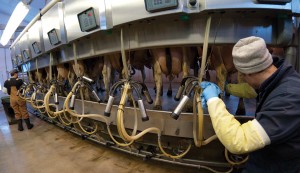


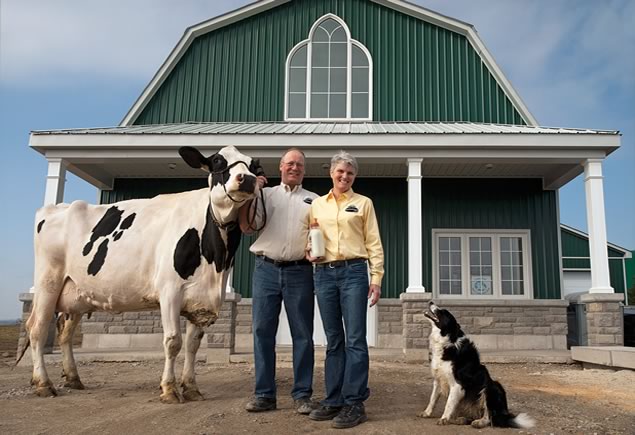
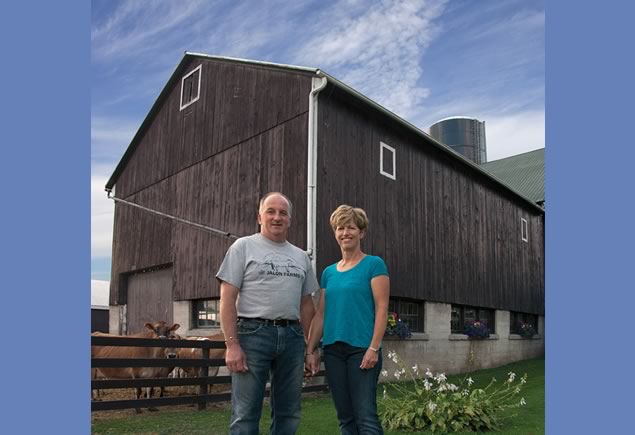
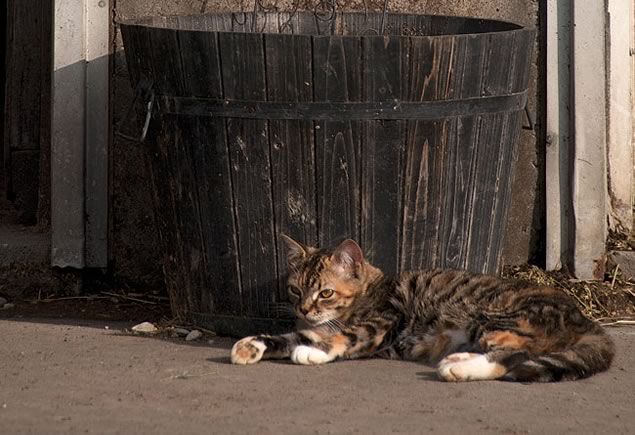

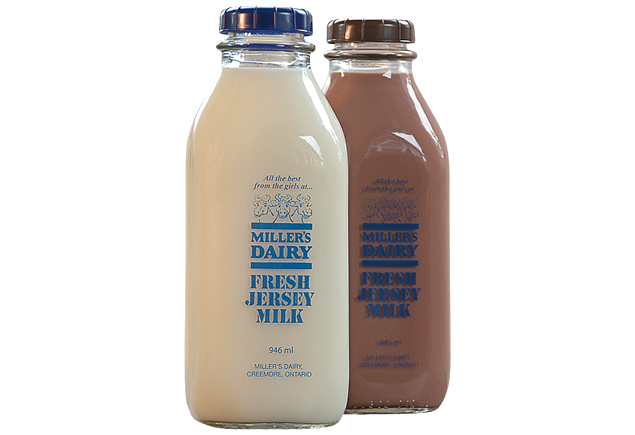
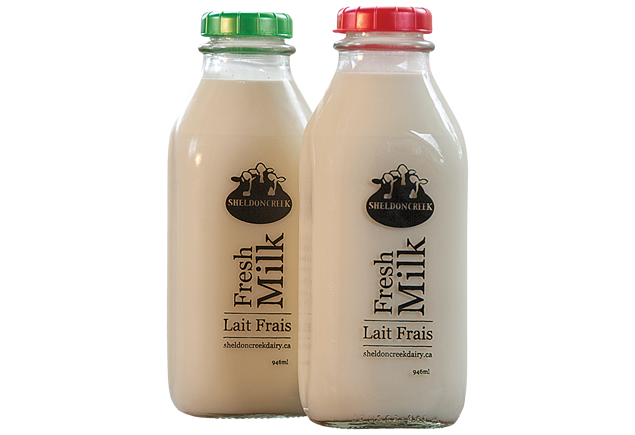
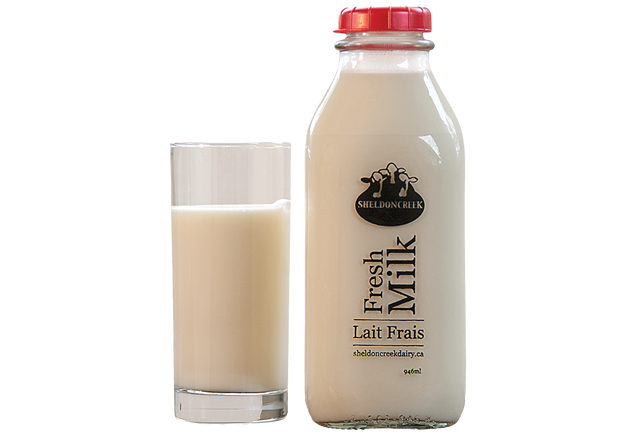
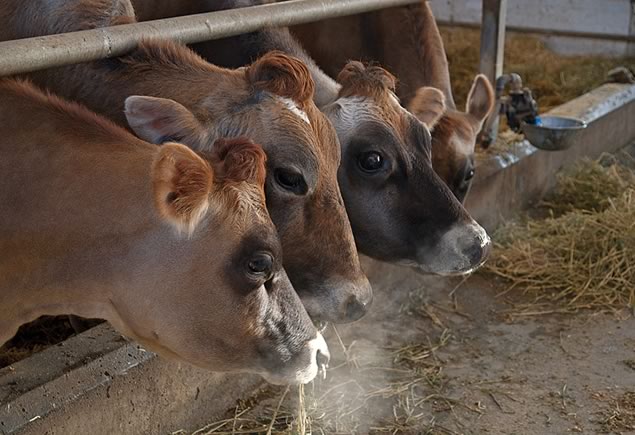







I’m so for the local food chain…but I”m rather curious, what about the bottle, do we just recycle the bottle?
Marlene from Alliston on Aug 23, 2012 at 12:51 pm |
This is great news that we are able to bring back a couple of local dairies, and can once again see the artisanal element of milk. We can go beyond just on farm processing though, as people have continued to do even when not supported by the DFO (though incorrectly forgotten about with ‘no farmers in Canada were processing their own fluid milk on-farm anymore’), and allow full production of raw milk. If we are to become milk connoisseurs, there would be great demand for raw milk, from cows treated ethically, and completely grass fed. Perhaps we can even get to the point of not even knowing what herd our milk comes from, but the individual cow that we personally know.
Ryan from Guelph, ON on Jun 23, 2012 at 8:47 am |
What a Great Idea! This brings the market back to the farm….and will encourage more to join in with their own commodity. Can’t wait to have local on farm milk in our area.
Lynn Hasson from Lindsay on Jun 23, 2012 at 7:17 am |